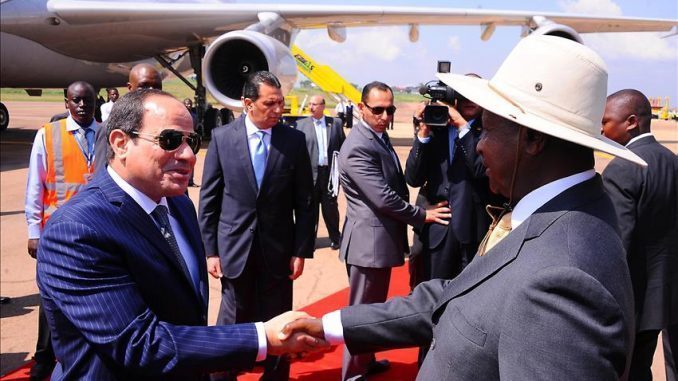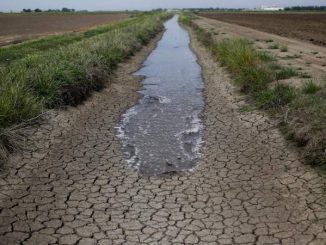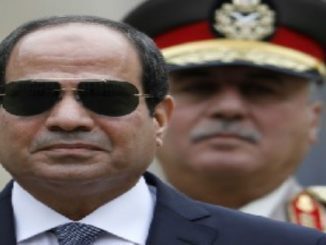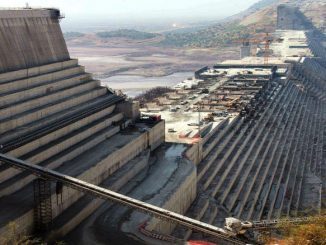
Egypt’s Abdel Fattah al-Sisi discussed with his Ugandan counterpart Yoweri Museveni boosting the water projects between both countries, particularly the maritime project that links between Lake Victoria and the Mediterranean Sea.
In fact, the project of linking Lake Victoria, the largest lake in Africa, and the Mediterranean Sea through the Nile River has been announced in 2015 from the Egyptian side to utilize its benefit from the river (the Nile) to provide an easy passage for transporting goods, commodities, agricultural and animal products among the Nile Basin countries (11 countries).
Al- Sisi’s visit to Uganda, that didn’t exceed one day, came a day after a prominent Saudi official had visited the Renaissance Dam in Ethiopia amid explicit tensions between Cairo and Riyadh.
During the Egyptian-Ugandan negotiations at the presidential palace in Kampala, Uganda’s capital, al-Sisi stressed that “Egypt is keen on activating the work of a joint committee between the two countries to be assembled as soon as possible, as well as establishing more joint development projects especially in the power sectors, the management of hydraulic, irrigation, agricultural and livestock resources,” according to a statement released by the Egyptian presidency.
The statement also cited the Ugandan President Museveni saying that al-Sisi’s visit is the first official visit by an Egyptian President to Uganda.
He expressed his agreement with al-Sisi’s words on the importance of activating the joint committee between the two countries.
In the same context, both the Egyptian and Ugandan leaders “welcomed the project linking Victoria Lake and the Mediterranean Sea,” stressing “the importance of taking necessary steps to carry out the project after ending the studies related to it.”
They also stressed their “Commitment to continuing the joint efforts to achieve the stability and development in Africa, especially the Nile River basin, the Great Lakes area and the African Horn.”
After the end of discussions, both countries signed an understanding memorandum regarding the regular negotiations on both the political and diplomatic matters.
Days ago, informed media sources said that Ahmed Al-Khatib, the adviser of Saudi King Salman bin Abdulaziz, paid a visit to the Ethiopian Renaissance Dam within the framework of his current presence in the Ethiopian capital, Addis Ababa, to find out the possibility of renewable energy generation.
The Saudi official visit came days after the visit of the Saudi Minister of Agriculture Abdulrahman bin Abdulmohsen al-Fadhli to Ethiopia.
The visit of the prominent Saudi officials to the Renaissance Dam in Ethiopia raised many questions from the Egyptian part in the light of the Egyptian-Ethiopian tensions on the effect of the dam on Egypt’s water shares from the Nile and the tensions between Cairo and Riyadh on regional issues as the Syrian file as well.
Saudi Arabia was a major supporter of the military-backed regime in Egypt following the 2013 coup against Mohamed Morsi, the country’s first freely elected president, and has channeled billions of dollars in support of Egypt’s economy.
However, since Egypt’s vote on the Russian-backed draft resolution in the United Nations security council, Saudi Arabia and Egypt have started a cold war on media platforms.
In the same context, Egyptian newspapers have reported hidden dissent among unofficial Egyptian academic and diplomatic sources regarding the Saudi’s stance.
In fact, Egypt fears that the establishment of the Renaissance Dam would have a negative impact on its water shares (55.5 billion cubic meters).
On the other side, the Ethiopians said that the dam will be beneficial especially in generating power and will have no harm on Egypt and Sudan.
The Ethiopian TV has announced there will be cooperation with Riyadh in building the dam.
In February 1999, the Nile Basin countries (11 countries) signed an initiative in Tanzania to enhance the regional cooperation. In 2010, Egypt and Khartoum suspended their activities in the initiative after the rest of the countries signed a framework treaty at Entebbe city in Uganda as they considered it shrinks their historical water shares from the Nile River.



